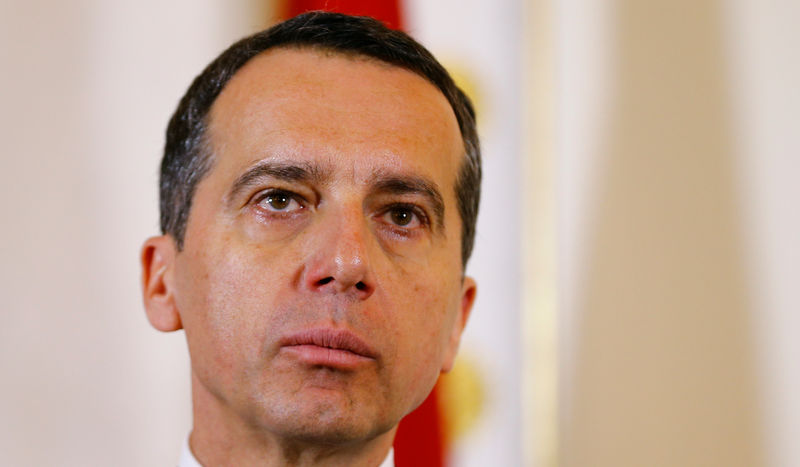By Francois Murphy
VIENNA (Reuters) - "A little less conversation, a little more action" sang Elvis Presley as Austrian Chancellor Christian Kern unveiled his "Plan A" list of policies last month - an injunction to coalition partners to get on board or face "Plan B" - a snap election.
This week, after another threat by Kern to dissolve the coalition, the government agreed a compromise package of policies aimed at shaking off its image as hopelessly ineffective in the roughly 18 months left until its term ends.
But that package - which includes a rise in the minimum wage and other economic adjustments, as well as a ban on Islamic face veils - may not be enough, analysts say, especially as some policies follow, rather than challenge, the stance of the far-right Freedom Party (FPO), which has a commanding poll lead.
The FPO, which has capitalised on Europe's migration crisis, presenting it as a threat to security and jobs, has the support of roughly a third of voters, polls show, followed by Kern's Social Democrats on around 27 percent, and his coalition partner, the conservative People's Party, on about 19 percent.
"This is the programme of two parties that, out of fear of the FPO, have transformed themselves into a kind of soft FPO," political analyst Anton Pelinka said, judging the economic and social policies to be "of astonishing harmlessness".
"They shied away from the big measures," political analyst Thomas Hofer said.
"This is not an ambitious shot, but it is a life-extending measure for the coalition."
While Chancellor Kern said the policy package "must achieve results" in the 18 remaining months, there is a good chance the coalition will not last that long. There is already speculation that a snap election will be called this autumn.
IF YOU CAN'T BEAT THEM, JOIN THEM?
Worryingly for the coalition's prospects, the plan's emphasis on security and immigration is likely to play into the hands of the FPO, analysts say.
With law-and-order measures ranging from tighter border controls to electronic monitoring of former jihadists, as well as restrictions on Islamic dress, the coalition has tried to counter the FPO's anti-immigration platform. But it risks backfiring, according to Christoph Hofinger of pollster SORA.
"Weakening someone by imitating them never works in politics," he said.
The proposals say civil servants should dress in a "religiously neutral" way, raising questions about how that will be implemented in the largely Catholic country.
The government says it will ban Muslim headscarves and other religious symbols but not remove the crucifixes often present in schools and courtrooms, drawing criticism from judges.
The confusion meant the public would continue to focus on the FPO's core issue, Hofinger said.
Kern, a former head of the national rail company who took over as chancellor in May, has styled himself as a competent manager freshly arrived from the business world.
He can take some solace from the fact that in terms of making the unruly coalition more productive than before, the bar is relatively low.
"(The policy plan) is more than the coalition has been able to achieve in most of its years working together," Hofer said.
"The aim for him was to show that he is capable of taking action and he managed to do that, to a limited extent, but still..."

Having chosen as his soundtrack a song that only became a global hit after Elvis died, Kern must now ensure he wins over his audience before he leaves the building.